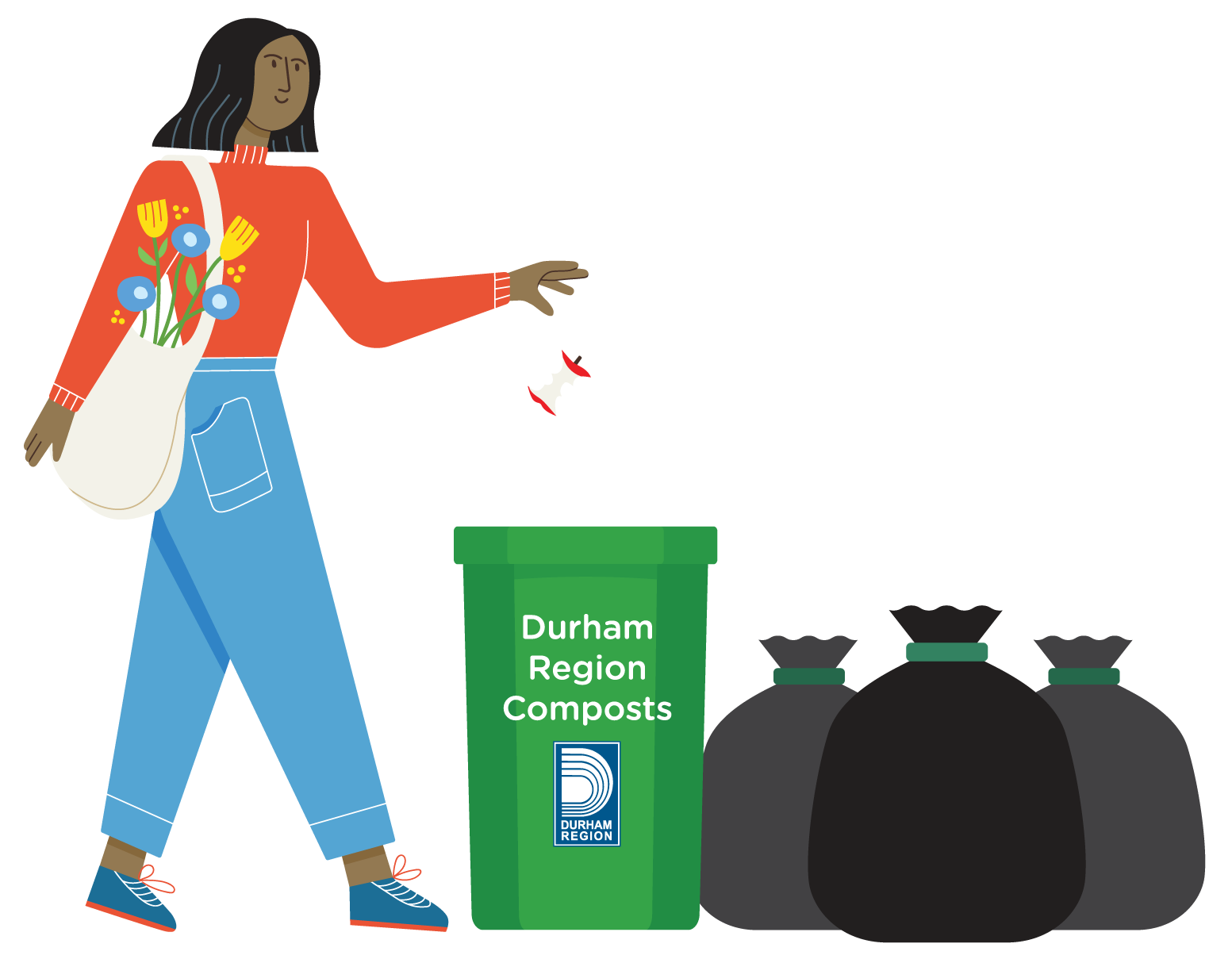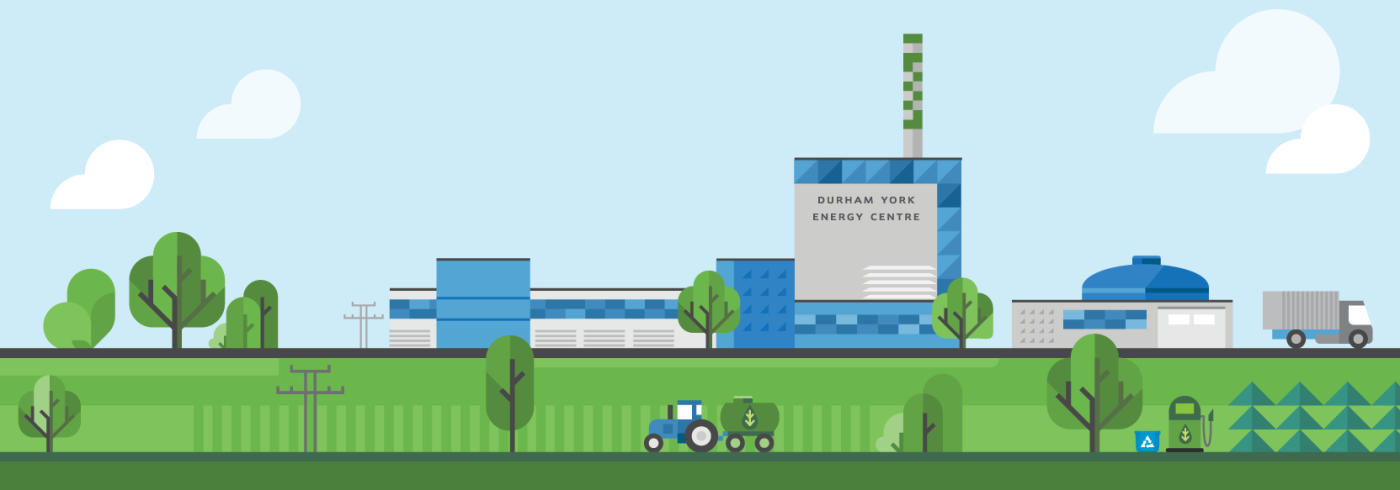Procurement for the Region’s Mixed Waste Pre-sort and Anaerobic Digestion Facility project has been paused on staff recommendation due to the volatile economic market (2022-COW-22). The Region’s long term waste management plan continues to focus on the diversion of organics, keeping in mind the Region’s rapidly growing population.
Anaerobic Digestion remains the preferred method for managing green bin material collected within the Region
Durham Region Council has made the decision to pause the Mixed Waste Pre-sort and Anaerobic Digestion (AD) Facility procurement process. The project was approved and is a key component of the Region’s long-term waste management plan. Unfortunately, due to the rapid rise in material, shipping and labour costs being experienced in the marketplace, Regional Council has agreed to revisit the short and long-term organics strategy with a staff report to Council in early 2023.
Regional staff and Council are committed to a sustainable long-term waste management strategy, finding cost effective and environmentally sustainable methods for the Region’s projected waste management needs. Although the Region may proceed with the project in the future, it has been paused considering current unsettled market conditions—recognizing that waiting for market stabilization may result in a significant benefit financially to the project, should it proceed in the future.
While the project is reviewed, the Region will continue to rely on existing processing contracts and will review its short term needs and long-term requirements to ensure waste and organics are processed in a cost effective and environmentally responsible manner.
Using waste as a resource

AD is a natural decomposition process that uses microbes found in the environment to produce methane, which can be collected and used as a renewable natural gas. AD is a safe, proven technology used within the waste and wastewater treatment sectors across North America and Europe.
The Region of Durham was planning a Mixed Waste Pre-sort and Anaerobic Digestion Facility to separate and convert waste like food scraps into renewable natural gas—used to heat homes and power natural gas vehicles and appliances.
Environmental Benefits
Mixed Waste Pre-sort and Anaerobic Digestion is still the preferred solution for Durham Region due to its many benefits, including:
- A reduction in greenhouse gas emission.
- Being a source of renewable natural gas.
- Ensuring compliance with anticipated regulations banning organic material from landfill.
- Increasing diversion rates.
- Deferring the need to expand the Durham York Energy Centre.
Background Project Documents
| Project Updates, Publicly Available Documents and Public Consultation |
| Project Updates |
|
|
| Publicly Available Documents |
| Council Reports |
- Negotiated Request for Proposal Results for the Design, Build, Operate and Maintain Contract for a Mixed Waste Pre-sort and Anaerobic Digestion Facility (June 22, 2022)
- Organics Management Solution Update - Request for Prequalification and Initiation of Request for Proposal Process (June 9, 2021)
- Facts about the Regional Municipality of Durham's Mixed Waste Pre-sort and Anaerobic Digestion Facility (May 28, 2021)
- Odour Mitigation Strategies for the Mixed Waste Pre-sort and Anaerobic Digestion Facility (February 5, 2021)
- Report on the Organics Management Solution – Joint Venture/Co-ownership with EPCOR Power Development Corporation (September 16, 2020)
- Anaerobic Digestion Facilities (August 28, 2020)
- The Regional Municipality of Durham's Evolving Integrated Waste Management System (August 14, 2020)
- Environmental Assessment Trigger for the Mixed Waste Pre-sort and Anaerobic Digestion Project (July 17, 2020)
- Organics Management Solution - Joint Venture Co-ownership with Epcor Utilities Inc., Recommended Project Site, Current Business Case and Risk Assessment Update, and Procurement Process (May 27, 2020)
- Mixed Waste Transfer and Pre-sort Anaerobic Digestion Facility Siting Report - Response to Comments from the Municipality of Clarington (May 27, 2020)
- Solid Waste Management: 2020 Strategic Issues and Financial Forecast (January 15, 2020)
- Organics Management Solution - Expression of Interest Process and Next Steps Including Site Identification Criteria and Anti-Lobbying Protocol (September 11, 2019)
- Organics Management Next Steps and Updated Preliminary Business Case (June 12, 2019)
- Organics Management Update and Next Steps (May 15, 2019)
- Results of the 2018 Residential Garbage Composition Study Undertaken by Canada Fibres Limited (March 27, 2019)
- 2019 Solid Waste Management Servicing and Financing Study (January 16, 2019)
- Request for Information #RFI-1158-207 for Mixed Waste Transfer and Pre-sorting, Organics Processing, and Beneficial Use of By-Products/End Products (June 6, 2018)
- Organics Management Technologies, Current System, Technology Drivers, Proposed Solution, Business Partnership/Relationship (May 23, 2018)
- Organics Management Request for Information Assessment (May 2, 2018)
- Organics Management Methods (March 23, 2018
- 2018 Solid Waste Management Servicing and Financing Study (January 10, 2018)
- Organics Management Strategy (June 7, 2017)
- Green Municipal Fund Grant Funding for the approved solid waste management study of options for long term organics management, including anaerobic digestion (March 1, 2017)
- 2017 Solid Waste Management Servicing and Financing Study (January 11, 2017)
- 2016 Solid Waste Management Servicing and Financing Study and forecast 2017 to 2025 (February 4, 2016)
- 2015 Annual Solid Waste Management Servicing and Financing Study (January 29, 2015)
- 2014 Annual Solid Waste Management Servicing and Financing Study (November 28, 2013)
- 2011 Annual Solid Waste Management Servicing and Financing Study (February 24, 2011)
- Moving Towards a 70% Diversion Target for Municipal Solid Waste (March 24, 2009)
|
| Information Reports |
|
|
| Presentations |
|
|
| Procurement |
|
|
| Technical Reports |
|
|
|
|
| Public Consultation |
| Mixed Waste Pre-sort and Anaerobic Digestion Facility | Siting Report |
| Comment period has closed. Questions? Contact us by email.
|
| Public Information Centre | February 27, 2020 |
|
Comment period has closed. Questions? Contact us.
|
|






